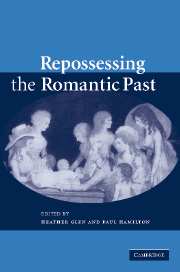Book contents
- Frontmatter
- Contents
- Notes on contributors
- Introduction
- PART I DISSENT AND OPPOSITION
- 1 ‘Severe contentions of friendship’: Barbauld, conversation, and dispute
- 2 Hazlitt's visionary London
- 3 Shelley's republics
- 4 Memoirs of a dutiful niece: Lucy Aikin and literary reputation
- 5 Holding Proteus: William Godwin in his letters
- PART II REOPENING THE CASE OF EDGEWORTH
- PART III DIFFERENT DIRECTIONS
- Marilyn Butler: a bibliography
- Index
4 - Memoirs of a dutiful niece: Lucy Aikin and literary reputation
Published online by Cambridge University Press: 15 December 2009
- Frontmatter
- Contents
- Notes on contributors
- Introduction
- PART I DISSENT AND OPPOSITION
- 1 ‘Severe contentions of friendship’: Barbauld, conversation, and dispute
- 2 Hazlitt's visionary London
- 3 Shelley's republics
- 4 Memoirs of a dutiful niece: Lucy Aikin and literary reputation
- 5 Holding Proteus: William Godwin in his letters
- PART II REOPENING THE CASE OF EDGEWORTH
- PART III DIFFERENT DIRECTIONS
- Marilyn Butler: a bibliography
- Index
Summary
AN AUTHORIZING FAMILY
The remarks that follow address a question that arose when I was working on a comparative study of the poetics of Anna Barbauld and Mary Robinson: I was struck by the way in which Mary Robinson's self-publicity as a woman of letters served as a form of self-protection against her notoriety as a courtesan and actress, while Anna Barbauld's eminence was shaped and burnished by a reputation machine, part of an intergenerational claim for the importance of her family within British culture as the embodiment of moral conviction from the seventeenth-century period of religious controversy to the liberal politics of the nineteenth.
Readers of Romantic poetry are now familiar with the poetry of Anna Laetitia Barbauld, whose two great poems, ‘A Summer Evening's Meditation’ and ‘Eighteen Hundred and Eleven’, bind a fifty-year life in writing that began in gladness and ended, if not in madness, in a share of despondency and sadness, as Barbauld felt herself marginalized by age and intellectual temperament in a new world of sentimental respectability. Unlike other Romantic-age poets, Barbauld is not considered to be a poet isolate; even her most startling poems belong to a fabric of assumptions and a level of confidence unimaginable for the deracinated Mary Robinson. And unlike Wordsworth and Coleridge and Southey, whose reputations were made, along with Mary Robinson's, through the contemporary periodical and newspaper press and from both collegial support and publicity (for example, the Biographia Literaria as an extended advertisement for Wordsworth's poetry), Anna Aikin's fame as a poet was part of the cultural work of a public family formation, elaborated and maintained through religious networks, periodicals, newspapers, educational institutions, and through a series of family memoirs.
- Type
- Chapter
- Information
- Repossessing the Romantic Past , pp. 80 - 97Publisher: Cambridge University PressPrint publication year: 2006
- 1
- Cited by

